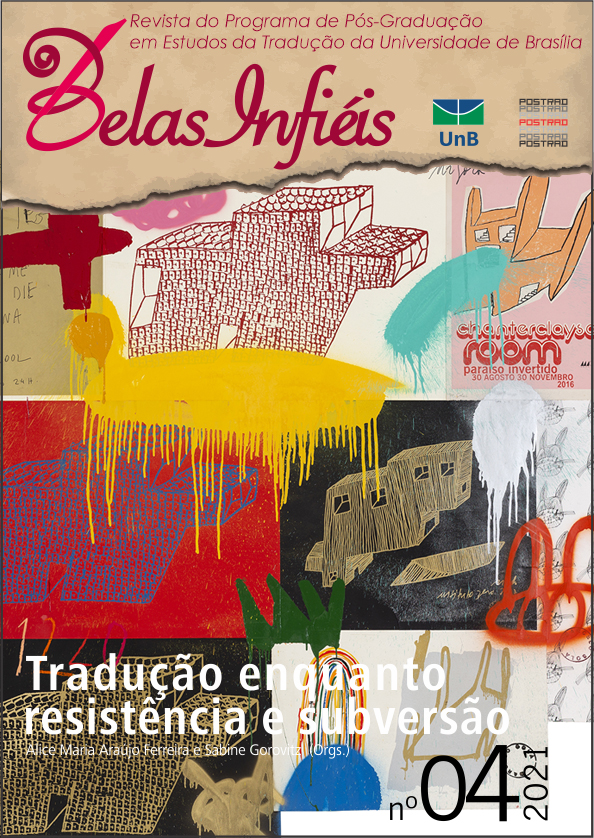Traducción y diferencia sexual Sobre Herculine Barbin de Emily Rose y El Principito de Julia Bucci
DOI:
https://doi.org/10.26512/belasinfieis.v10.n4.2021.36595Palabras clave:
Diferencia sexual. De Lotbinière Harwood. Herculine Barbin. Le petit prince. Traducción feminista.Resumen
Este ensayo breve aborda la relación entre proyecto de traducción y diferencia sexual a partir de tres textos: Re-Belle et Infidèle/The Body Bilingual: Translation as a Re-Writing in the Feminine (1991), de Susanne de Lotbinière-Harwood, como marco; el web blog Translating Herculine, desarrollado a partir del diario de Herculine Barbin editado por Michel Foucault (1978), de autoría de la investigadora Emily Rose; y la traducción de El Principito de Julia Bucci, inscrita en el proyecto editorial feminista Ethos traductora, de Buenos Aires. Se trata de ver cómo se despliegan en estos textos estrategias y criterios de traducción para hacer visible en la lengua traducida la diferencia sexual en combinaciones entre teoría feminista y experimentación formal.
Descargas
Citas
Obras citadas
Barbin, Herculine, Antonio Serrano y Michel Foucault (2007). Herculine Barbin, llamada Alexina B. Talasa.
Bhabha, Homi K (2004). The Location of Culture. Routledge.
Burneo Salazar, Cristina (2018). “El lenguaje inclusivo es un peligro y una necesidad”. Letras Libres.https://www.letraslibres.com/espana-mexico/cultura/el-lenguaje-inclusivo-es-un-peligro-y-una-posibilidad
Cixous, Hélène (2007). La llegada de la escritura. Amorrortu.
De Saint Exupéry, Antoine (2018). El principito. Ethos. Traducción de Julia Bucci e ilustraciones de Malena Gagliesi.
Kolesnicov, Patricia (2018). “‘Todes les adultes primero fueron chiques’: hasta El Principito ahora habla en lenguaje inclusivo”. Entrevista a Gabriela Villalba. Clarín. https://www.clarin.com/cultura/todes-adultes-primero-chiques-principito-ahora-habla-lenguaje-inclusivo_0_HrLWKcwB4.html
Di Paola, M. (2018) “‘Re-belle et infidèle’. El feminismo canadiense y sus reflejos en las narrativas artísticas del in-betweenness: Mona Hatoum, Chantal Akerman y Ghada Amer”. Anales de Historia del Arte nº 28, 133-146.
Lorde, Audre (1984). Sister outsider. The Crossing Press Feminist Series, 2007.
Lotbinié€re-Harwood, Susanne (1991). Re-belle Et Infidé€le: La Traduction Comme Pratique De Réécriture Au Féminin = the Body Bilingual : Translation As a Re-Writing in the Feminine. Montréal. Quebec: Éditions du Remue-ménage.
Rose, Emily (2015-2018). Translating Herculine. The memoirs of Herculine Barbin. Web blog. https://translatingherculine.wordpress.com/about/
Wilson, Patricia (2013). “La traducción y sus discursos: Apuntes sobre la historia de la traductología”. Exlibris (Dossier) ”¢ #2/ 82, UBA.
___________________ (2019). Página impar: Textos sobre la traducción en Argentina: conceptos, historia, figuras. Ethos.
Descargas
Publicado
Cómo citar
Número
Sección
Licencia
Derechos de autor 2021 CC BY

Esta obra está bajo una licencia internacional Creative Commons Atribución 4.0.
Copyright Statement
Given the public access to this journal, the texts are free to use but requires the recognition of the original authorship and initial publication in this journal to be properly stated.
The journal allows the use of works published for non-commercial purposes, including the right to submit the work to publicly accessible databases. Published contributions are the sole and exclusive responsibility of the author(s).
- When submitting papers to be evaluated by the Belas Infiéis journal, the author(s):
- Declare that the contents of the contributions are original and of their original creation, being entirely responsible for their content if there is an objection by third parties.
- Claim to be aware that they should not commit academic plagiarism.
- Declare that the manuscript has not been published, completely or partially, in Portuguese or another language. If it is a translation it should be submitted to the Translated Articles section.
- Declare that the manuscript is not being evaluated by other journals.
- Declare that the manuscript was not submitted to another journal simultaneously.
- Commit(s) to inform the journal of any kind of error or inaccuracy in their contribution (published, in evaluation or in editing) and to collaborate with the editors to make due corrections of the article (when in evaluation or editing) or erratum/retraction (after publication).
- Declare that there is no conflict of interest regarding the published work.
- Authorize its release if it is accepted for publication without any kind of monetary compensation.
- Agree to assign non-exclusive rights to publication to the magazine, remaining free to make their contribution available in other media as long as the publication of the first version in Belas Infiéis magazine is mentioned. They also authorize Belas Infiéis to assign their texts for reproduction in content indexers, virtual libraries and similar platforms.
- Maintain copyright and grant the journal the right of first publication, the work being licensed under theCreative Commons Attribution License.
- Is/Are allowed and encouraged to publish and distribute their work online after the editorial process, which may increase the impact and citation of the published work.
- Authorize the editorial team to make textual adjustments and to adapt the article to the publication rules, when necessary.



















